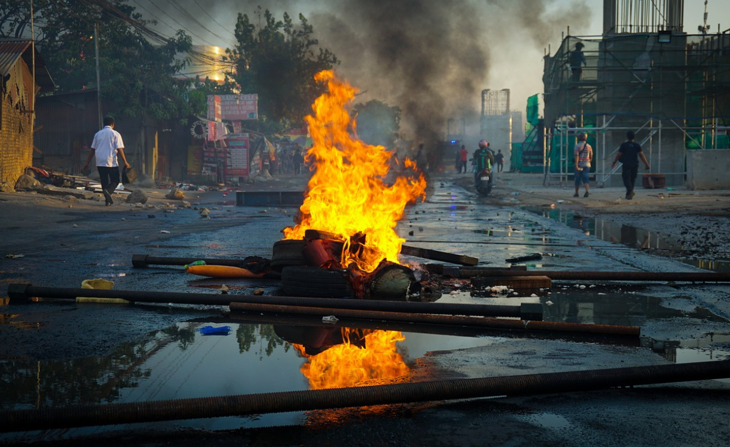 @Pixabay.
@Pixabay.
The era of globalisation and commerce-orientated policymaking by governments has been side-lined by increasing regionalisation, export controls, and a growing number of barriers to trade and finance, said a new political risk report.
Marsh, part of Marsh McLennan, released its 2024 Political Risk Report, which outlined the major trends in the current global political and economic landscape that will impact multinationals and investors in the year ahead.
The report, published by Marsh Specialty, said that long-term uncertainty – in what is globally the biggest election year in history – is stemming from macroeconomic competition and geopolitical insecurity. “This will create even greater economic divergence between sectors and economies, amid growing government intervention and the increasing frequency of harder-to-predict disruptive security events,” said the report.
The world’s global trading system has been under pressure since the Covid-19 pandemic, due to new trends in reshoring and nearshoring – such as manufacturing jobs leaving Asia for the US, particularly from China, which suffered a post-Covid reopening economic shock that has affected many investment appetites.
“Many governments have issued significant financial support and imposed trade barriers to protect economically and politically important domestic industries."
James Pomeroy, Global Economist, HSBC, told Insurance Investor last year that, “the global trading system is evolving to be less focused on Chinese exports. It will likely become a more diversified system."
Marsh added that what was driving this change in globalisation was, in part, a renewed focus by governments on ensuring supply chain resilience, protecting national security, and delivering a successful green transition.
“Over the past five years, many governments have issued significant financial support and imposed trade barriers to protect economically and politically important domestic industries,” the report said.
Governments have also encouraged investment in climate-friendly sectors, sometimes disregarding existing international economic rules. This shift coincides with an increasingly inward-looking electorate; an IPSOS global poll found that positive perceptions of “globalisation” had dropped 10% in all countries surveyed.
The economic shocks of the past few years have also had an effect on political risks that could lead to hot conflicts, which would have direct consequences for investors and portfolios.
“As Western governments join others in stepping up unilateral intervention in economic activity, those same governments are increasingly being seen as disengaging from all but the most significant global security issues,” said the report. “Many governments and other actors around the world are no longer deterred by the perceived consequences that may have once discouraged military action – for example, the Syrian government’s actions across the country, Russia’s war in Ukraine, and attacks on shipping in the Red Sea by Houthis.”
This shift can be seen in data, the report said. The number of conflicts worldwide has doubled since 2005 and will likely remain high for the foreseeable future. “With the perception of fewer consequences and without credible resolution mechanisms, conflicts may last longer; since 2000, conflicts are lasting 50% longer on average,” Marsh said.
"There are sources of continued supply-side price pressures looming over the next two years, from El Niño to the potential escalation of live conflicts."
Supply chains have been a focal point for some time now. In January, the World Economic Forum’s 2024 risk report – published in conjunction with Zurich Insurance and Marsh – focused on the effects of the global disruption of supply chains and consequent economic fallout.
The report said that these strains were growing in the short term. “There are multiple sources of continued supply-side price pressures looming over the next two years, from El Niño conditions to the potential escalation of live conflicts,” it noted.
These realities will continue to put pressure on most economic models – designed for and built off data from an era of relative economic and political stability – to forecast future outcomes. “As some actors take advantage of the heightened level of insecurity and unpredictability, assets and investments in many foreign markets may be more exposed to political violence, terrorism, expropriation, or disruption,” the report said.
The report focused on political risks that were emerging, how investors should think about them, and the pain points it believed were currently overstated.
“Investors and corporates should consider, however, whether the unease and noise that is expected to build over the coming months about the stability of the US political system is wholly warranted,” it said, aligning with other market experts who have said that the US election will be of little consequence at a macro level.
“Advanced economies benefit from important debt safeguards that can limit the risks faced by investors."
However, long term issues included the consideration of a possible US ‘policy paralysis’, and the possible “impact of opportunistic strategies by other countries” will “help organisations identify and manage potential political, economic, and credit risk factors”.
The report highlighted that the US was still a safe market in which to invest, despite political turmoil. “Unlike some of their emerging market peers, however, these advanced economies benefit from important debt safeguards that can limit the risks faced by investors. US debt is expected to remain the world’s safe-haven asset,” it added.
Another area of interest was Japan. Yields on Japan’s debt are uniquely low and, therefore, unusually sustainable. Meanwhile, Italy’s sovereign risk remains manageable thanks to the euro and the watchful eye of the European Central Bank (ECB).
“Nevertheless, high debts may discourage further subsidy implementation and support the ongoing implementation of trade barriers,” the report said.